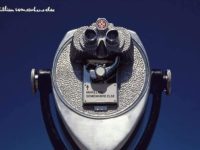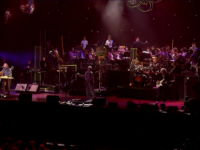Marillion have, from their earliest days, been a band who have stuck out. During their genesis in the early 1980s, they were conspicuous in flying the progressive-rock flag at a time characterized by the onslaught of post-punk experimentation, new-romantic glamour and the aggressive charge of hardcore and heavy metal. Many thought Marillion were years late to the prog party; others reveled in the glory of a band unique in the U.K. musical landscape.
A cult following in the strongest and truest sense of both words grew, and in 1983 their debut album Script for a Jester’s Tear was unleashed. This very English band, at that point led by patriotic Scottish giant Derek William Dick (aka Fish), were an underground phenomenon. They launched their own magazine, titled The Web. Their record sleeves had a theme and a beauty, courtesy of young artist Mark Wilkinson.
All of this helped tighten Marillion’s fanbase further, and showed a band determined to stand out. Fish’s use of theatrical stage make-up cemented it all. Script for a Jester’s Tear was comprised of merely half a dozen tracks, in stark contrast to Bad Brains’ Rock for Light, which crammed 17 tunes into its grooves – most of which came in at less than two minutes or so in length. Both entirely different albums, released a month apart, both from different underground scenes. And both representative of exactly what a hungry young band should be.
Marillion’s underground success evolved into the mainstream with 1985’s Misplaced Childhood. An awesome piece of work, the album contained two Top 10 hit singles in “Kayleigh” and “Lavender.” Then their charismatic frontman left the band as commercial success peaked in the aftermath of Clutching at Straws. Fortunately, Fish was replaced by an equally charismatic, but radically different frontman in ex-European singer Steve Hogarth.
Steve’s voice was more powerful and deeper than Fish’s, and his ability to play several instruments added new elements to the band’s sound. Nevertheless, they were at a crossroads: Inflatable fish were held aloft at concerts as the transition was made. A joke maybe, but a joke with a mild protest behind it, possibly.
That was all decades ago. It’s since been made clear that Steve Hogarth’s arrival gave Marillion fresh impetus, and they have never looked back.
The body of work produced since has been consistently of high quality – and. at times, simply fantastic. There is no single disappointment in their catalog of albums, from 1989’s Season’s End to 2016’s FEAR. The latter is conceptual and contemporary, contains soundscapes, anthems (“One Tonight”) and gives social and environmental commentary with “Living in Fear.”
In between those albums, Marillion’s brave and determined career has produced conceptual work (including 1994’s Brave and 2004’s Marbles), further instances of Marillion going against the grain. Regular commercial material (1991’s Holidays in Eden and 1997’s This Strange Engine) has arrived alongside work taking in the world around them (2012’s Sounds That Can’t Be Made). Energized by keyboardist Mark Kelly, Marillion effectively invented crowdfunding when they found themselves without a record label at the end of the last century. The modern-sounding 2000 album Anoraknophobia was the result.
Last year was a busy one for the band. Fan conventions – these almost spiritual, euphoric gatherings – took place on both sides of the Atlantic and across Europe. Three nights worth of full live performances showcased 2008’s Happiness is the Road, plus a full range of material from Steve Hogarth’s tenure in the band. (Just one track from the Fish era, “Slainte Mhath,” was included. Performed with real gusto, that one brought the house down, incidentally.)
Later in 2019, Marillion were out on tour once again, this time with a difference: They were accompanied by expanded version of In Praise of Folly, the string quartet who collaborated with Marillion during the 2017 conventions. This addition lifted the live performance of that year’s featured album, 2001’s Marillion.com, to new heights, providing an almost renaissance-style quality.
In Praise of Folly features Annemie Osbourne (cello), Maia Frankowski (violin), Margaret Hermant (violin and harp) and Nicole Miller (violin, viola). They were joined by a French horn player Sam Harris and flautist Emma Halnan for what became 2019’s Friends from the Orchestra tour. An accompanying album was recorded at Real World Studios with new versions of existing tracks, familiar to Marillion fans. Production was by Michael Hunter.
This is an exercise that does not come without risk. The usual criticism a band receives when releasing new versions from its back catalog is obviously that no original or new songs are involved. Perhaps the band are only looking to please their existing fanbase, who already know the tunes. Maybe it’s for anoraks only. Valid points, for sure.
Marillion themselves have already successfully trod this path with the acoustic Less Is More album. As well as providing stripped-down versions of previous recordings, the album gave fans alternative takes. The jazzy leanings of “The Space,” for instance. The flexibility and skill of the rhythm section, courtesy of Ian Mosely and Pete Trewavas, shone through time and time again on Less Is More – and it was critically acclaimed, something most of the band’s albums now seem to enjoy.
With Friends From the Orchestra is no exception. It is, however, vastly different from Less Is More. The orchestral arrangements, courtesy of producer and collaborator Michael Hunter, are full and would make an enjoyable album independently. However, when the band joins forces with these musicians, the effect is quite stunning.
Kicking off with an orchestrated opening worthy of morning radio on BBC Radio 3, “Estonia” sets the mood for the project. Steve Rothery’s subtle guitar jangle leads into Steve Hogarth’s opening vocal salvo, as is typical for this number. However, the impact of the orchestra and Marillion operating in glorious unison is most felt in the uplifting chorus: “No one leaves you when you live in their hearts and minds.”
Together, they provide textures that support the lyric to its fullest. Strings glide and support the chord structure, without taking it over with too many virtuoso moments. The chorus is one of the band’s strongest, and a firm live favorite. The addition of violins and cellos, together with brass and wind, raise the emotion further. A strong beginning.
The inclusion of “A Collection” is welcome. Not previously available on any studio album, it is a number many would have heard live but possibly, unless they own the remastered copy of Holidays In Eden, may not have in their own, erm … collection. It was recorded around the time of the 1991 album but kept off its original release. Still, “A Collection” was regularly played live, including many occasions when Steve Hogarth showed a collection of polaroids on a screen as part of the performance. So, an inspired choice for inclusion and it gives Marillion the chance to incorporate the song accordingly onto an album, rather than retrospectively.
The tune itself finds In Praise of Folly accompanying Steve Rothery’s acoustic guitar in a gentle, whimsical and meandering opening and the strings, flute and horn provide an effective sonic wash throughout to create a piece of work full of charm. A treat.
“Fantastic Place” benefits from similar treatment. It again has a subtle, beautiful opening, created by the orchestra. However, the song, as on the original recording, soon gets a nudge and then a small kick to raise the tempo – especially when Steve Rothery’s guitar break kicks in. Again, we have a rock band and orchestra working perfectly together, each doing what it does best. “Fantastic Place” grows, builds, then eventually reaches a crescendo and gracefully winds down again. With Friends From the Orchestra is certainly made so much the easier in having material of the highest quality to work on, and “Fantastic Place” is a good example.
To describe “Ocean Cloud’ – a song about Donald Allum, the first – and, so far, only person to row both ways across the Atlantic – is an epic is an understatement, to say the least. In the context of this album, it is a symphony containing several movements. The components of the original and live versions are intact – a big guitar solo, storytelling, justification for the voyage, radio commentary, re-occurring chorus, majestic keyboards. The orchestra flesh it out further, adding to the drama, with an endless barrage of clever and effective arrangements and interludes. Musical interpretations of solitude, loneliness, tension and danger abound, from the band’s signature instrumentation to the strings, horns and flute. The sound of crashing waves and storms (actual and emotional), the experience of one man’s battle with the sea and all it has to offer, are translated and delivered to the listener. It’s an experience.
“Beyond You” is a much shorter affair. A sombre, string opening guides the listener carefully, slowly raising the tension before the tune tentatively begins to run. That again echoes the original recording but the orchestral arrangements, in conjunction with Marillion, provide a refreshing new dynamic to this track from 1995’s Afraid of Sunlight. The swooping strings during this track’s final bars, both with the band behind them and then naked, are particularly effective.
The album’s second lengthy epic is “This Strange Engine,” another live favorite. Marillion knew what they were doing in selecting these numbers for inclusion. The natural light and shade of the track are accentuated using plucked string touches behind distorted guitar licks, orchestral riffage (new term, just invented it …) behind saxophone solos and commanding string glissandos. Another symphony with several movements, its structure was already in place. The challenge here was to make a new recording of “This Strange Engine” not merely interesting but justifiable. The passion of Steve Hogarth’s vocal over a band and orchestra locking together to such intense effect during the finale indicate how well this has been achieved.
“Seasons End” was the title track of the band’s first album of the post-Fish era, and it’s another very familiar number to the band’s followers. The French horn arrangements almost steal the show here. We all love the sound of a French horn, right? That doleful sadness? Well, take a listen to Sam Harris here. The addition of the orchestral arrangement during the track’s intense finale is simply breath-taking.
The interpretation of “Hollow Man” is, again, particularly effective. It’s a song with self-analysis in the lyric, and the addition of sinister-sounding strings adds to the introspective delivery. Often played live with just a piano accompaniment, this number’s hollow and empty sound needs an appropriate orchestral arrangement to achieve its effect – and that’s what “Hollow Man” gets here.
“The Sky Above the Rain” brings the triumphant With Friends From the Orchestra to a close. From the moment it appeared as the last track on Sounds That Can’t Be Made, “The Sky Above the Rain” became much loved across Marillion’ fan network. A tale of change, knowing the right thing is not to be with someone, this song lends itself perfectly for the emotive sound of an orchestra. Emma Hanlan’s flute uses the musical space beautifully, almost giving the track hints of Ralph Vaughan Williams. It is evocative of a landscape, to my ears – either urban or rural. Anyone who has experienced the feeling a life changing may be aware of how it is to stare out of a window, at a field, a streetlamp, or a road sign – or whatever. Marillion invite their friends from the orchestra to add to this musical landscape to create a thing of heart-rendering beauty. Together, under the direction of Michael Hunter, they have very much succeeded.
With Friends From the Orchestra is not an album that will necessarily lead to Marillion gaining legions of new followers. The tracks contained are not their hit singles. There is no “Lavender,” no “Hooks in You” or “You’re Gone.” The latter was a Top 10 hit as the band embraced the power of the internet in the ’00s – and another example of the determined path they have led, operating independently away from the rest.
The tracks selected for orchestral treatment are certified fan favorites. There will be some new admirers gained but, to me, With Friends From the Orchestra is the sound of a band rightly sailing the crest of an ever bigger and better wave, while continually sticking out from that mainstream music scene. It can only be hoped that Marillion realize how much their fans appreciate them for this.
- Ellen Foley Talks ‘Bat Out of Hell,’ Ian Hunter and ‘Fighting Words’: Something Else! Interview - July 9, 2021
- Pink Floyd’s ‘Atom Heart Mother’: 50 Years Gone - March 30, 2020
- Marillion – ‘With Friends From the Orchestra’ (2019) - January 16, 2020




